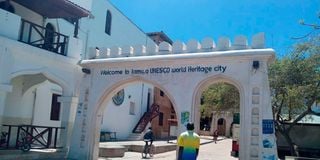How Lamu's unique baby naming tradition keeps World Heritage status alive

The entrance to Lamu Town. If you visit the Lamu Archipelago, you are likely to notice that the inhabitants have either common or repeated names.
If you visit the Lamu Archipelago, you are likely to notice that the inhabitants have either common or repeated names.
It's not surprising to hear someone's full name as Fumo Fumo Kupi, Shee Mbwana Shee, Titi Bwana Bwana, Shebwana Bwana Bwana, Abubakar Abubakar, Ali Ali and Mohamed Skanda Mohamed, among others.
In such a scenario, one might quickly conclude that these islanders like repetition in naming their children. But is it really as repetitive as it sounds?
Nation.Africa set out to find out why the people of Lamu have this tradition of giving their children double or repeated names.
Lamu was put on the Unesco World Heritage List in 2001. One of the key factors that led to Lamu's listing is the way in which the people of the archipelago have preserved their culture and traditions. And one of those ways is how they name their children.
The repetition of names by residents is nothing more than an effort by residents to keep the Lamu culture and heritage alive.
In an interview with the Nation on Tuesday, Lamu Council of Elders vice chairman Mohamed Mbwana Shee noted that a lot of consideration goes into naming in Lamu.
Also read: What do you call your child?
The archipelago is predominantly inhabited by Swahili Muslims of Bajuni origin.
Since time immemorial, the naming of children, boats and roads in Lamu has always incorporated a unique traditional angle, in line with culture, season and personal relationships, Shee says.
Some of the popular Bajuni names in Lamu are; Nyashee, Shee, Kupi, Vae, Kale, Lali, Bwana, Somoye, Famau, Fumo and Fankupi, among others.
"We prefer to use our own local names when naming our children or places, be it roads or boats. Even the so-called repetition isn't really repetition, but rather an attempt to keep the family tree alive. If my ancestor is called Famau, then we make sure that our sons are named after him. That's why you'll see someone called Famau Famau Fumo. It gives the child an identity and at the same time acts as a reminder of our ancestors," says Shee.
Mr Abdalla Abdalla Mohamed, a Bajuni scholar in Lamu's old town, says: "First of all, we're Bajuni and our names have to reflect that. Secondly, we live in a place that's on the World Heritage List. So our actions have to reflect that. That's why we have tried to identify ourselves through the names we have given our newborn babies. I am Abdalla Abdalla Mohamed. My son is called Abdalla Mohamed Abdalla. The old name of our ancestor, Abdalla, doesn't leave our family," says Abdalla.
Mr Abubakar Abubakar Mohamed says having an ancestral name as part of a child's name means a lot.
Child's personality
According to Abubakar, it means that that particular baby is accepted as a member of the society.
He is called Abubakar, and his father named him after his grandfather.
"When you send money to my phone, don't be shocked to see Abubakar Abubakar, because those are the exact names on my identity card. My father gave me these names to show gratitude to Allah (God) and to ensure that I have the ancestral family identity as Bajuni and Muslim," says Abubakar.
Ms Fathima Fankupi, an elder, notes that names also reflect a child's personality.
Fankupi says names are a form of remembrance because they are mostly given to remember relatives such as grandparents, uncles and aunts.
Children are also named after the time of day, season and place, great leaders and heroes, important historical events, animal names such as Simba (lion), and religious or divine names, among others.
"We really appreciate the art of naming. We're always careful not to stray from our origins and identity. It's how we've kept our Lamu culture and heritage alive to this day. It's something we're proud of," says Fankupi.
Also read: What’s in a name? A lot!
Despite the community’s efforts to preserve the ancient art of naming, which has subsequently contributed to the strengthening and continuation of the Lamu archipelago as a Unesco World Heritage Site, some of the residents are still a worried lot.
There is an increase in foreign baby or child naming techniques that threaten the region's culture and heritage.
Mr Kupi Somoye, an elder, says there has been a trend of children in Lamu being given modern names, including names from Arabia, India, Asia and the US, among others.
Somoye notes in dismay that some children are even named after famous singers and dancers.
He says their efforts to discourage or sensitise the community not to give their children foreign names and to take indigenous names instead have not had much impact.
He lamented that many people, especially the younger generation today, feel it's old-fashioned to give their children indigenous names like Fumo, Kale, and others. "That's why you see a child named Maher, Mandhal and Sumeiya instead of Somoye, among others. The young generation prefers uniqueness in naming their children, and that's a big threat to our culture.





